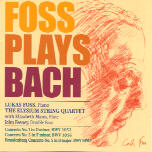It is surprising to hear these works performed in such an old-fashioned way. Surrounded only by a string quintet and a flute–an ensemble not dissimilar to what Bach might have had at his disposal, pianist Lukas Foss proposes a straightforward, intimate, lyrical reading of Bach’s concertos. His classical approach considers neither Baroque performance practice nor Glenn Gould’s controversial recordings. But probably because he’s also an experienced composer and conductor, Lukas Foss plays with enough clarity and conviction to minimize the importance of stylistic questions. His rock-solid tempos, detailed articulation, and carefully shaped dynamics make a point out of every single note. While they are not ultimately very memorable, and certainly not a first choice, these well-recorded performances will please listeners with more conservative tastes, who can’t stand period instruments or Gould’s idiosyncrasies. The Elysium String Quartet, flutist Elisabeth Mann, and bass player John Feeney are sensitive and sympathetic contributors to Foss’ intriguing interpretations.
































